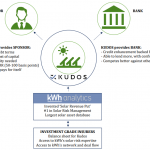The Big Win You Missed
by Tom Konrad, Ph.D., CFA
My friend Jan Schalkwijk, CFA of JPS Global Investments just asked me if I had any thoughts on Kontrol Energy (KNR.CN, KNRLF), a Canadian smart building firm I had never heard of. (I just added it to AltEnergyStocks.com's Energy Efficiency and Smart Grid stock lists.)
The stock had just shot up after the client sold and went on a kayaking trip. It had disclosed a sensor for detecting COVID-19 from the air.
While I didn't have anything to say about the company, I did have some thoughts on dealing with the emotions around missing out. Since it's...
The Difference between Reality and Pandering
Garvin Jabusch Innovation and increasing economic efficiency have always been the keys to profits and wealth. Getting more value out of systems without commensurate increases in inputs is the definition of growing efficiency, and it has been the engine of human economies since someone figured out how to use energy from a water wheel to grind grain instead of doing it by hand with a stone bowl and pestle. With that development (to simplify), a couple family members could run the wheel, freeing up everyone else for other pursuits. This kind of gain is the hallmark, to greater and...
Green Energy Investing For Beginners, Part I: Stocks, Mutual Funds, or ETFs
Tom Konrad CFA Investing in green energy can be good for both the climate and your wallet. How good depends on choosing the right investment vehicles (mutual funds, ETFs, or stocks) and sectors to invest in. This will get you started. More and more investors are investing in green energy. According to the Cleantech Group, the Cleantech sector is now the largest sector for venture capital investment. Green Energy is not just for venture capitalists. Small investors have done well in 2009. Since the market bottomed at the start of March, the average green energy mutual fund topped...
How to Buy Losers: Tricking Yourself with Cash-Covered Puts
It's that time of year again. I've started studying for the third (and final) CFA® exam, and my readers are "treated" to my theories of the market and trading. No stock picks today; put your thinking caps on! CAPM: Nice Theory, Too Bad About the Market In Level II of the exam, we studied efficient-market theories, such as CAPM and APT. I actually like an elegant theory (I spent nearly decade of my life studying mathematics), but as a market practitioner, I know the market doesn't work that way. I learned this lesson the hard way. Early in my...
When Market Calls are Wrong
Tom Konrad, Ph.D., CFA. My recent market call now looks premature. What lessons can we learn? When we make market predictions, we will inevitably be wrong some of the time. I stuck my neck out at the start of June, saying "We're near the peak." I later gave some numbers to allow readers to objectively judge if that call was right or wrong. I said that we should consider it an accurate call if the S&P 500 fell 20% (to 756) before it rose 5% (to 992.) The S&P 500 has not yet come near 756, but it closed...
How Weather Risk Transfer Can Help Wind & Solar Development
by Daryl Roberts
The Need To Accelerate Renewables Adoption
Renewables are growing rapidly as a percentage of new electric generation, but are still being assimilated too slowly and still constitute too small of a fraction of total generation, to be able to transition quickly enough to scale into a low carbon economy in time to mitigate climate change.
The issue of providing public support, with subsidies and other reallocation methods, is a politically charged subject. High carbon advocates, for example American Petroleum Institute, argues that support for renewables distorts the market. On the other hand, it has been argued, for example by...
Asking the Right Questions: Why Invest in Clean Energy?
Tom Konrad, Ph.D., CFA Often, knowing more about a company is less useful than knowing just a few of the right things. Knowing the right questions to ask can help investors wade through a sea of mostly irrelevant information. Take a moment to answer the following poll: Suppose you want to know if fictional solar Company MySolar will outperform other solar stocks. Which fact would be most useful in your decision?(poll) The key to this question was the stated goal of "outperforming other solar stocks." An investor who is only hoping to achieve returns equal...
The Catholic Church Shouldn’t be Investing in Abortion Clinics
Tom Konrad CFA Jesus Saves, but where does he invest? Photo via Bigstock. This article is not about the Church, or abortion. As far as I know, the former does not invest in the latter. This article is about investing, and morality. Since 350.org began its campaign to get endowments and pensions to divest from fossil fuels, I've heard two basic criticisms of the movement from my colleagues in the investment management profession. Endowments selling their fossil fuel investments won't stop us from using fossil...
Navigating the Clean and Bloody Streets of Europe
Tom Konrad CFA Blood In the Streets Walter Rothschild, 2nd Baron Rothschild Image via Wikipedia Baron Rothschild was an 18th century British nobleman who supposedly originated the phrase "Buy when there's blood in the streets, even if the blood is your own." Although accounts differ, Rothschild was a successful banker, and supposedly made a fortune buying in the panic that followed the Battle of Waterloo against Napoleon. True or not, the...
Beating the Market, Part I
Because I'm currently studying for the second (of three) CFA® exam, I'm going to take a break from my usual article analyzing some aspect of alternative energy. This week and next, I'll take a step back and try to answer an existential question: How can I possibly hope to beat the market, when "the market" consists of professional money managers with resources far exceeding my own? Every active investor should ask themselves this question: the answer will either make you a better investor, or save you a lot of time and money if you are humble enough to realize...
Green Energy Investing for Experts, Index and Wrap-Up
Tom Konrad, CFA My Green Energy Investing for Experts series looked at ways shorting could both protect your portfolio against market decline, and make it greener by shorting decidedly non-green companies. This is an index of the entries, plus one more industry for you to consider. Green Energy Investing for Experts, Part I made the case that shorting stocks that are particularly vulnerable to peak oil or climate change is a good way to hedge a portfolio of green stocks against a market decline while making the whole portfolio greener. Green Energy Investing for Experts, Part II looked at...
An Elephant Hunter Explains Inflection Point Investing
John Petersen In "An Elephant Hunter Explains Market Dynamics" I discussed the two basic types of public companies; earnings-driven companies that are “bought” in top-tier weighing machine markets and event-driven companies that are “sold” in lower-tier voting machine markets. Today I'll get a bit more granular and show how "sold" companies usually fall into one of two discrete sub-classes that have a major impact on their stock market valuations. As a starting point, I'll ignore the China-based companies that are listed in the US because their quirky metrics would only confuse the analysis. Then I'll break...
Climate-Risk Adjusted Returns and the Weasel Coefficient
By Tom Konrad, Ph.D., CFA
An 80% Weasel Coefficient
Some activists, including a friend of mine, recently had a conversation with representatives of TIAA to try to persuade them to divest from fossil fuels. The conversation was mostly cordial, but predictably did not get anywhere.
One of the activists summed up the response from TIAA as “a non-response with a weasel coefficient of at least 80%.” Regarding the weasel coefficient, he also asked,
Can anyone explain to me what "our overarching strategy which targets climate-risk adjusted returns over the long-term” means in plain English?
Well, yes. Yes I can.
Climate Risk Adjusted Returns
When an investment...
Short Demand for Cree High and Rising
I got a call from my broker this morning asking me if I'd be willing to loan out my shares of Cree, Inc. (NASD:CREE) to a short seller. Since the only cost to me is that I will not be able to vote my shares, and I will earn 2.5% per annum on the value, I said "yes." Normally, brokerages get the shares they lend out to shorts from margin accounts with a margin balance. Since I never carry a balance (although I do have a margin account in order to trade options) they must ask my permission...
The Big Short and Picking a Money Manager
If you're going to have someone else manage your money, consider their incentives carefully. I just finished reading Micheal Lewis's excellent book The Big Short: Inside the Doomsday Machine on the Wall Street's role in the subprime mortgage meltdown and the few investors who saw it coming. I began with a low opinion of the effectiveness of the vast majority fund managers and advisors who manage other people's money for a living, but the the highly-paid gross negligence and/or incompetence of the people running the CDO operations of the big Wall Street banks in the years leading...
How to Beat the Market: Less Money and More Judgement
Last week, I looked at how a small investor could gain an advantage in the market by understanding the other players. The most important other players are institutional investors such as hedge funds, pension funds, mutual funds, and investment banks who have considerably more resources and valuation skills than the individual investor, and so trying to take them on directly to beat them at their own is likely to be an expensive exercise in futility. Two Exploitable Weaknesses On the other hand, I argued that institutional investors have certain handicaps and biases which do allow small investors to enter...





